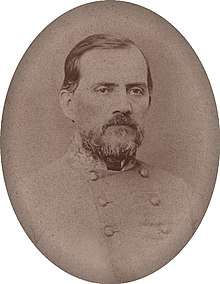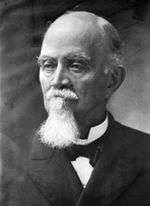Edmund Pettus
Edmund Winston Pettus (born July 6, 1821 – July 27, 1907) was an American politician who represented Alabama in the United States Senate from 1897 to 1907. He previously served as a senior officer of the Confederate States Army who commanded infantry in the Western Theater of the American Civil War. After the war, he was politically active in the Ku Klux Klan, serving as a grand dragon.[1]
Edmund Pettus | |
|---|---|
 | |
| United States senator from Alabama | |
| In office March 4, 1897 – July 27, 1907 | |
| Preceded by | James L. Pugh |
| Succeeded by | Joseph F. Johnston |
| Personal details | |
| Born | Edmund Winston Pettus July 6, 1821 Athens, Alabama, U.S. |
| Died | July 27, 1907 (aged 86) Hot Springs, North Carolina, U.S. |
| Political party | Democratic |
| Relations | John J. Pettus (brother) |
| Alma mater | Clinton College |
| Military service | |
| Allegiance | |
| Branch/service | |
| Years of service | 1847–1849 (USA) 1861–1865 (CSA) |
| Rank | Brigadier general (CSA) |
| Battles/wars | Mexican–American War American Civil War (POW) |
The Edmund Pettus Bridge across the Alabama River in Selma, built in 1940, was named in his honor. The bridge became a landmark of the American civil rights movement in 1965 when armed Alabama police attacked unarmed peaceful civil rights demonstrators, including John Lewis and Hosea Williams, as they sought to march to the state capital of Montgomery. The incident became known as Bloody Sunday.
Early life and career
Edmund Pettus was born in 1821 in Limestone County, Alabama.[2] He was the youngest of nine children of John Pettus and Alice Taylor Winston, a brother of John J. Pettus, and a distant cousin of Jefferson Davis.[3] Pettus was educated in local public schools, and later graduated from Clinton College located in Smith County, Tennessee.[4]
Pettus then studied law in Tuscumbia, Alabama, under William Cooper and was admitted to the state's bar association in 1842. Shortly afterward he settled in Gainesville and began practicing as a lawyer. On June 27, 1844, Pettus married Mary L. Chapman, with whom he had three sons, two of whom died in infancy, and two daughters.[5] Also that year he was elected solicitor for the seventh Judicial Circuit of Alabama.[6]
During the Mexican–American War in 1846–48, Pettus served as a lieutenant with the Alabama Volunteers, and after the end of hostilities he moved to California, where he fought against the Yukis and other Native Americans.[7]
By 1853, he returned to Alabama, serving again in the seventh circuit as solicitor. He was appointed a judge in that circuit in 1855 until resigning in 1858. Pettus then relocated to the now extinct town of Cahaba[4] in Dallas County, Alabama, where he again took up work as a lawyer.[8]
American Civil War
In 1861, Pettus, an enthusiastic champion of the Confederate cause and of slavery, was a Democratic Party delegate to the secession convention in Mississippi, where his brother John was serving as governor. Pettus helped organize the 20th Alabama Infantry, and was elected as one of its first officers.[4] On September 9, he was made the regiment's major, and on October 8, he became its lieutenant colonel.[7]
Pettus served in the Western Theater of the American Civil War. During the Stones River Campaign, he was captured by Union soldiers on December 29, 1862, and exchanged a short time later for Union soldiers. Pettus was captured again on May 1, 1863, while part of the surrendered garrison that had been defending Port Gibson in Mississippi. He managed to escape and return to his own lines. Pettus was promoted to colonel on May 28, and given command of the 20th Alabama.[7]

During the 1863 Vicksburg Campaign, Pettus and his regiment were part of the force defending Confederate control of the Mississippi River. When the garrison surrendered on July 4, Pettus was again a prisoner until his exchange on September 12.[7] Six days later he was promoted to the rank of brigadier general,[9] and on November 3 he was given brigade command in the Army of Tennessee.[7] Pettus and his brigade participated in the Chattanooga Campaign, posted on the extreme southern slope of Missionary Ridge on November 24, and fought during the action the following day.[10]
Pettus and his command took part in the 1864 Atlanta Campaign, fighting in the battles of Kennesaw Mountain on June 27, Atlanta on July 22, and Jonesborough from August 31 to September 1.[6] Beginning on December 17, he temporarily led a division in the Army of Tennessee.[11] During the 1865 Carolinas Campaign, Pettus was sent to defend Columbia, South Carolina, and fought in the Battle of Bentonville from March 19–21.[6] Pettus was wounded in this fight, hit in his right leg during the battle's first day. On May 2 he was paroled from Salisbury, North Carolina, and, four months after the Confederacy surrendered, Pettus was pardoned by the U.S. Government on October 20.[7]
Later life

After the war, Edmund Pettus returned to Alabama and resumed his law practice in Selma. Pettus served as chairman of the state delegation to the Democratic National Convention for more than two decades.[2] In 1877, during the final year of Reconstruction, Pettus was named Grand Dragon of the Alabama Ku Klux Klan. With earnings from his law practice, he bought farm land.[2]
In 1896, at the age of 75, Pettus ran for U.S. Senate as a Democrat and won, beating incumbent James L. Pugh. The state legislature, rather than state voters, elected United States Senators then. His campaign relied on his successes in organizing and popularizing the Alabama Klan and his prominent opposition to the constitutional amendments following the Civil War that elevated former slaves to the status of free citizens.[2] On March 4, 1897, he began service in the U.S. Senate. The state legislature re-elected him on 26 January 1903 and 22 January 1907. This term would begin two years later, in 1909.
Pettus died at Hot Springs, North Carolina, in the summer of 1907, at age 86, while still in office and elected for the next term. He is buried in Live Oak Cemetery in Selma.[8]
Legacy
Military historian Ezra J. Warner wrote that Pettus was "a fearless and dogged fighter and distinguished himself on many fields in the western theater of war" and after his promotion to a general officer "he followed with conspicuous bravery every forlorn hope which the Confederacy offered..."[4] Likewise historian Jon L. Wakelyn summed up his military career by saying " … he volunteered for service in the Confederate Army and distinguished himself in the western command."[6]
As a U.S. Senator, Pettus was "the last of the Confederate brigadiers to sit in the upper house of the national Congress."[4]
In 1940, the Edmund Pettus Bridge across the Alabama river in Selma was named after him. On March 7, 1965, it became a civil rights movement landmark when 525 to 600 civil rights marchers on their way from Selma to Montgomery attempted to cross the bridge, but were turned back and attacked by Alabama state troopers and members of the Ku Klux Klan. This event has since been called Bloody Sunday.[12] There have been calls to change the name of the bridge to honor the late Civil Rights activist and long-term Congressman John Lewis.[13]
See also
- List of American Civil War generals (Confederate)
- List of United States Congress members who died in office (1900–49)
Notes
- Watson, Elbert L. (January 5, 2015). "Edmund Pettus". Encyclopedia of Alabama.
- Whack, Errin (March 7, 2015). "Who Was Edmund Pettus". Smithsonian. Smithsonian.com. Archived from the original on April 22, 2019. Retrieved March 7, 2014.
- Eicher (2), p. 427. Wakelyn, p. 344.
- Warner, p. 238.
- Watson, Elbert L. (January 5, 2015). "Edmund Pettus". Encyclopedia of Alabama.
- Wakelyn, p. 344.
- Eicher (2), p. 427.
- "Biographical Directory of the U.S. Congress". uab.edu. Retrieved January 31, 2009.
- Wright, p. 112. Appointed from Alabama on September 19, 1863, to rank from September 18, and confirmed by Confederate Congress February 17, 1864.
- Eicher (1), p. 607.
- Eicher (2), p. 427. Led Stevenson's Division until wounding on March 19, 1865.
- "Selma to Montgomery March". stanford.edu. Retrieved February 5, 2009.
- "Support swells for renaming Edmund Pettus Bridge in Selma to honor John Lewis after his death". Retrieved July 18, 2020.
References
- Eicher (1), David J., The Longest Night: A Military History of the Civil War, Simon & Schuster, 2001, ISBN 0-684-84944-5.
- Eicher (2), John H., and David J. Eicher, Civil War High Commands. Stanford: Stanford University Press, 2001. ISBN 978-0-8047-3641-1.
- Sifakis, Stewart. Who Was Who in the Civil War. New York: Facts On File, 1988. ISBN 978-0-8160-1055-4.
- Wakelyn, Jon L., Biographical Dictionary of the Confederacy, Greenwood Press, 1977, ISBN 0-8371-6124-X.
- Warner, Ezra J. Generals in Gray: Lives of the Confederate Commanders. Baton Rouge: Louisiana State University Press, 1959. ISBN 978-0-8071-0823-9.
- Wright, Marcus J., General Officers of the Confederate Army: Officers of the Executive Departments of the Confederate States, Members of the Confederate Congress by States. Mattituck, NY: J. M. Carroll & Co., 1983. ISBN 0-8488-0009-5. First published 1911 by Neale Publishing Co.
External links
- Edmund Pettus at Find a Grave
- Edmund Pettus and John Tyler Morgan, late senators from Alabama, Memorial addresses delivered in the House of Representatives and Senate frontispiece 1909
- United States Congress. "Edmund Pettus (id: P000279)". Biographical Directory of the United States Congress.
| U.S. Senate | ||
|---|---|---|
| Preceded by James L. Pugh |
U.S. senator (Class 3) from Alabama 1897–1907 Served alongside: John T. Morgan, John H. Bankhead |
Succeeded by Joseph F. Johnston |
| Honorary titles | ||
| Preceded by Daniel T. Jewett |
Oldest living U.S. Senator January 6, 1901 – July 27, 1907 |
Succeeded by John Conness |
